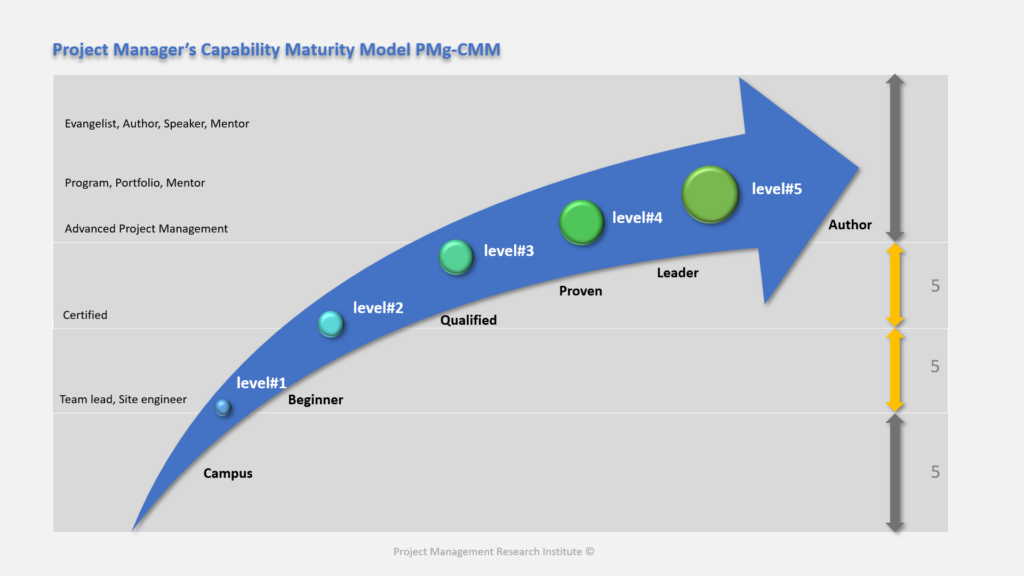Have you ever wondered why some really climb up the professional ladder where as many do not, despite having the same credentials and opportunities? When we studied the careers of very successful project professionals, we could identify the following 7 habits common across the achievers.
- Good foundation – Most of them had good grades in their academics and they pursued their project career in the areas related to their field of study.
- Application of Project Management – They had clarity on their academic and professional goals and they applied project management to achieve them.
- Focus on long term rewards – Their focus is on long term rewards than on the short term benefits.
- Continuous on the job learning – The first ten years of their career was dedicated to gaining hands on experience and learning new things.
- Strategic Credential enhancement – They continuously improved their knowledge and authenticity through globally accepted qualifications.
- Networking – They are good in networking with others in the profession.
- Pro-activeness – They are pro-active in sensing opportunities ahead and pursued them before others.
What is the Opportunity awaiting Capable Project Professionals?
By 2027, employers will need 87.7 million individuals working in project management oriented roles. The talent gap could result in a potential loss of some US$207.9 billion in GDP through 2027 for the 11 countries analyzed (China, India, USA, Japan, Brazil, Germany, UK, Canada, Australia and the Middle East region). PMI (2017). Project Management Job Growth and Talent Gap 2017–2027. Even though the pandemic might have negatively impacted these projections, this is good time to get ready to leverage the opportunities ahead.
How to leverage these 7 habits to advance your profession?
If you want to understand how to systematically plan your project management career goals proactively, and to achieve them at the appropriate time, then read ahead;
What is PMg-CMM?. How will it help career progression?
The objective of the Project Manager’s Capability Maturity Model is to provide a professional ecosystem comprising of aspiring professionals, mentors, trainers, organizations and recruiters collaborating around a structured road map for meticulous planning and progression of project management as a profession.
The diagram below depicts the five levels of project management professional maturity.

Level#1 – Beginner
At Level#1
- Because you are technically good, you are asked to manage teams
- You are not aware of the basic project management tools and techniques and their application
- You think project management is about just getting things done at any cost
- Success is inconsistent and short lived
- In the longer run, You and the team members fail to perform as a single unit due to internal conflicts
- Though you have technology mentors, you do not have mentors to guide you on the management side to the right degree
Level#2 – Professionally qualified
At Level#2
- You get certified in one of the popular project management certifications, hoping to improve your job prospects.
- You are aware of the globally accepted project management best practices.
- You would have realized how the application of these best practices would have helped you to prevent some of the challenges you faced before.
- You start applying and leveraging some of the project management core practices
- As and when challenges arise, you leverage the models, methods & artifacts recommended by global standards
- You have good mentors who can guide you professionally
Level#3 – Professionally proven
At Level#3
- You have proven yourself as a dependable project manager who can manage small to medium complexity projects
- You are highly respected within the project organization
- You are considered to manage prestigious projects
- You become a role model for other budding project managers within the organization
- You are good at nurturing your professional networks
- You have good mentors and you start mentoring others
Level#4 Strategic Role
At Level#4
- You are invited to strategic project portfolio meetings
- In some cases your expert advise is sought to improve the project management capability of the organization (PMO)
- You will be asked to manage programs or very large projects
- You leverage your professional networks to great advantage
- You have mentors and you yourself is a highly sought after mentor
Level#5 Leadership Role
At Level#5
- You are considered as an expert authority in project management
- You contribute to the project management community by way of research and knowledge sharing
- Great deal of you time is spent in mentoring individuals, teams, organizations and communities
How quickly one traverse through these levels depends on their ambition, commitment, mentoring and the ability to pivot according to the market trends. Instead of growing vertically through the five maturity levels, one has the opportunity to grow horizontally as ‘T’ skilled professionals who have in-depth domain expertise in a particular trade supported by good project management capability as well.
